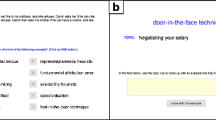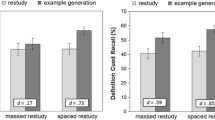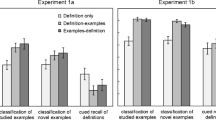Abstract
Students in many courses are commonly expected to learn declarative concepts, which are abstract concepts denoted by key terms with short definitions that can be applied to a variety of scenarios as reported by Rawson et al. (Educational Psychology Review 27:483–504, 2015). Given that declarative concepts are common and foundational in many courses, an important question arises: What are the most effective techniques for learning declarative concepts? The current research competitively evaluated the effectiveness of various example-based learning techniques for learning declarative concepts, with respect to both long-term learning and efficiency during study. In experiment 1, students at a large, Midwestern university were asked to learn 10 declarative concepts in social psychology by studying provided examples (instances of concepts that are provided to students illustrate how the concept can be applied), generating examples (instances of concepts that the student generates on his or her own to practice applying the concept), or by receiving a combination of alternating provided examples and generated examples. Two days later, students completed final tests (an example classification test and a definition cued recall test). Experiment 2 replicated and extended findings from experiment 1. The extension group was a variation of the combination group, in which participants were simultaneously presented with a provided example while generating an example. In both experiments, long-term learning and study efficiency were greater following the study of provided examples relative to the other example-based learning techniques.





Similar content being viewed by others
Notes
Declarative concepts are a type of relational category, which is an umbrella term used to encompass various subtypes of concepts that involve the representation of relations between features or entities. Research on relational categories is relatively scant compared to the vast literature on feature-based categories (i.e., categories that are represented by a set of independent, perceptual attributes). Goldwater and Schalk (2016) note that relational categories are distinct from feature-based categories in content and representational form; relational categories also differ from feature-based categories in the extent to which they involve processes such as structural alignment, mapping, integration, and analogical reasoning. Thus, “without a specific focus on relational categories and knowledge, the degree to which cognitive theories [i.e., theories about feature-based categories] can inform education is ultimately limited” (p. 730). In contrast, research on the learning of other kinds of relational categories can be leveraged to inform investigation of declarative concept learning of interest here. To foreshadow, we lean heavily on prior research on the learning of rule-based concepts (another type of relational category) to motivate our design and predictions in the current research.
Concerning long-term learning, no parallels can be drawn because the rule-based concepts literature has almost always used immediate rather than delayed tests to assess learning (e.g., Paas and van Merrienboer 1994).
References
Anderson, L. W., Krathwohl, D. R., & Bloom, B. S. (2001). A taxonomy for learning, teaching and assessing: a revision of Bloom’s taxonomy of educational objectives. Boston, MA: Allyn & Bacon.
Balch, W. R. (2005). Elaborations of introductory psychology terms: effects on test performance and subjective ratings. Teaching of Psychology, 32, 29–34.
Barnett, S. M., & Ceci, S. J. (2002). When and where do we apply what we learn?: a taxonomy for far transfer. Psychological Bulletin, 128(4), 612–637.
Blaisman, R. N., Dunlosky, J., & Rawson, K. A. (in press). The what, how much, and when of study strategies: Comparing intended versus actual study behavior. Memory.
Braver, S. L., Thoemmes, F. J., & Rosenthal, R. (2014). Continuously cumulating meta-analysis and replicability. Perspectives on Psychological Science, 9(3), 333–342.
Cantrambone, R., & Holyoak, K. J. (1989). Overcoming contextual limitations on problem-solving transfer. Journal of Experimental Psychology: Learning, Memory, and Cognition, 15(6), 1147–1156.
Carroll, W. M. (1994). Using worked examples as an instructional support in the algebra classroom. Journal of Educational Psychology, 86(3), 360–367.
Cepeda, N. J., Pashler, H., Vul, E., Wixted, J. T., & Rohrer, D. (2006). Distributed practice in verbal recall tasks: a review and quantitative synthesis. Psychological Bulletin, 132(3), 354–380.
Cortina, J. M., & Nouri, H. (2000). Effect size for ANOVA designs. Thousand Oaks: CA: Sage.
Dornisch, M., Sperling, R. A., & Zeruth, J. A. (2011). The effects of level of elaboration on learners’ strategic processing of text. Instructional Science, 39, 1–26.
Dunlosky, J., Rawson, K. A., Marsh, E. J., Nathan, M. J., & Willingham, D. T. (2013). Improving students’ learning with effective learning techniques: promising directions from cognitive and educational psychology. Psychological Science in the Public Interest, 14(1), 4–58.
Ebbinghaus, H. (1885). Memory: a contribution to experimental psychology. New York: NY: Columbia University Press.
Faul, F., Erdfelder, E., Buchner, A., & Lang, A. G. (2009). Statistical power analyses using G*power 3.1: tests for correlation and regression analyses. Behavior Research Methods, 41, 1149–1160.
Gick, M. L., & Holyoak, K. J. (1983). Schema induction and analogical transfer. Cognitive Psychology, 15, 1–38.
Glover, J. A., & Corkill, A. J. (1987). Influence of paraphrased repetitions on the spacing effect. Journal of Educational Psychology, 79, 198–199.
Goldwater, M. B., & Schalk, L. (2016). Relational categories as a bridge between cognitive and educational research. Psychological Bulletin, 142(7), 729–757.
Gorrell, J., Tricou, C., & Graham, A. (1991). Children’s short and long-term retention of science concepts via self-generated examples. Journal of Research in Childhood Education, 5(2), 100–108.
Gurung, R. A. R. (2005). How do students really study (and does it matter)? Teaching of Psychology, 31, 164–166.
Gurung, R. A. R., Weidert, J., & Jeske, A. (2010). Focusing on how students study. Journal of the Scholarship of Teaching and Learning, 10(1), 28–35.
Hamilton, R. (1989). The effects of learner-generated elaborations on concept learning from prose. The Journal of Experimental Education, 57(3), 205–217.
Hamilton, R. (1990). The effect of elaboration on the acquisition of conceptual problem-solving skills from prose. The Journal of Experimental Education, 59(1), 5–17.
Hamilton, R. (1997). Effects of three types of elaboration on learning concepts from text. Contemporary Educational Psychology, 22, 299–318.
Hamilton, R. (1999). The role of elaboration within a text processing and text adjunct context. British Journal of Educational Psychology, 69, 363–376.
Hamilton, R. (2004). Material appropriate processing and elaboration: the impact of balanced and complementary types of processing on learning concepts from text. British Journal of Educational Psychology, 74, 221–237.
Holyoak, K. J. (2012). Analogy and relational reasoning. In K. J. Holyoak & R. G. Morrison (Eds.), The Oxford handbook of thinking and reasoning (234–259). New York: Oxford University Press.
Howe, M. J. A., & Singer, L. (1975). Presentation variables and students’ activities in meaningful learning. British Journal of Educational Psychology, 45, 52–61.
Judd, C. M., & McClelland, G. H. (1989). Data analysis: a model-comparison approach. San Diego, CA: Harcourt Brace Jovanovich.
Kalyuga, S., Rikers, R., & Paas, F. (2012). Educational implications of expertise reversal effects in learning and performance of complex cognitive and sensorimotor skills. Educational Psychology Review, 24(2), 313–337.
Kornell, N. (2009). Optimising learning using flashcards: spacing is more effective than cramming. Applied Cognitive Psychology, 23, 1297–1317.
Leahy, W., Hanham, J., & Sweller, J. (2015). High element interactivity information during problem solving may lead to failure to obtain the testing effect. Educational Psychology Review, 27(2), 291–304.
Lishner, D. A. (2015). A concise set of core recommendations to promote the dependability of psychological research. Review of General Psychology, 19, 52–68.
Maner, J. K. (2014). Let’s put our money where our mouth is. If authors are to change their ways, reviewers (and editors) must change with them. Perspectives in Psychological Science, 9, 343–351.
Murphy, G. (2004). The big book of concepts. Cambridge: MIT press.
Nievelstein, F., van Gog, T., van Dijck, G., & Boshuizen, H. P. A. (2013). The worked example and expertise reversal effect in less structured tasks: learning to reason about legal cases. Contemporary Educational Psychology, 38(2), 118–125.
Paas, F., & van Merrienboer, J. J. G. (1994). Variability of worked examples and transfer of geometrical problem-solving skills: a cognitive load approach. Journal of Educational Psychology, 86, 122–133.
Rawson, K. A., & Dunlosky, J. (2011). Optimizing schedules of retrieval practice for durable and efficient learning: how much is enough? Journal of Experimental Psychology: General, 140(3), 283–302.
Rawson, K. A., & Dunlosky, J. (2013). Relearning attenuates the benefits and costs of spacing. Journal of Experimental Psychology: General, 142, 1113–1129.
Rawson, K. A., & Dunlosky, J. (2016). How effective is example generation for learning declarative concepts? Educational Psychology Review, 28(3), 649–672.
Rawson, K. A., Thomas, R. C., & Jacoby, L. L. (2015). The power of examples: illustrative examples enhance conceptual learning of declarative concepts. Educational Psychology Review, 27, 483–504.
Renkl, A., Atkinson, R. K., Maier, U. H., & Staley, R. (2002). From example study to problem solving: smooth transitions help learning. Journal of Experimental Education, 70(4), 293–315.
Roediger, H. L., & Butler, A. C. (2011). The critical role of retrieval practice in long-term retention. Trends in Cognitive Sciences, 15(1), 20–27.
Rosenthal, R., & Rosnow, R. L. (1985). Contrast analysis: focused comparisons in the analysis of variance. New York: Cambridge University Press.
Rowland, C. A. (2014). The effect of testing versus restudy on retention: a meta-analytic review of the testing effect. Psychological Bulletin, 140(6), 1432–1463.
Salden, R. J. C. M., Koedinger, K. R., Renkl, A., Aleven, V., & McLaren, B. M. (2010). Accounting for beneficial effects of worked examples in tutored problem solving. Educational Psychology Review, 22, 379–392.
Schmidt, S. (2009). Shall we really do it again? The powerful concept of replication is neglected in the social sciences. Review of General Psychology, 13, 90–100.
Simmons, J. P., Nelson, L. D., & Simonsohn, U. (2011). False-positive psychology: undisclosed flexibility in data collections and analysis allows presenting anything as significant. Psychological Science, 22(11), 1359–1366.
Simons, D. J. (2014). The value of direct replication. Perspectives on Psychological Science, 9, 76–80.
Tabachnick, B. G. & Fidell, L. S. (2001). Using multivariate statistics. Boston, MA : Allyn & Bacon.
Taraban, R., Maki, W. S., & Rynearson, K. (1999). Measuring study time distributions: implications for designing computer-based courses. Behavior Research Methods, Instruments, & Computers, 31(2), 263–269.
van Gog, T., & Kester, L. (2012). A test of the testing effect: acquiring problem-solving skills from worked examples. Cognitive Science, 36(8), 1532–1541.
van Gog, T., Kester, L., Dirkx, K., Hoogerheide, V., Boerboom, J., & Verkoeijen, P. P. J. L. (2015). Testing after worked example study does not enhance delayed problem-solving performance compared to restudy. Educational Psychology Review, 27(2), 265–289.
van Gog, T., Paas, F., & van Merrienboer, J. J. G. (2006). Effects of process-oriented worked examples on troubleshooting transfer performance. Learning and Instruction, 16(2), 154–164.
Vaughn, K. E., Dunlosky, J., & Rawson, K. A. (2016). Effects of successive relearning on recall: does relearning override the effects of initial learning criterion? Memory and Cognition, 44, 897–909.
Weinstein, Y. Lawrence, J. S., Tran, N., Frye, A. A. (2013). How and how much do students really study? Tracking study habits with the diary method. Poster presented at the 54th Annual Meeting of the Psychonomic Society; Nov. 14–17; Toronto, ON, Canada.
Wilkinson, L., & Task Force on Statistical Inference, American Psychological Association, Science Directorate. (1999). Statistical methods in psychology journals: guidelines and explanations. American Psychologist, 54, 594–604.
Woloshyn, V. E., Paivio, A., & Pressley, M. (1994). Use of elaborative interrogation to help students acquire information consistent with prior knowledge and information inconsistent with prior knowledge. Journal of Educational Psychology, 86(1), 79–89.
Author information
Authors and Affiliations
Corresponding author
Appendix A: Methods and Results for the Paraphrase Definition Group in Experiment 1
Appendix A: Methods and Results for the Paraphrase Definition Group in Experiment 1
Experiment 1 included a fourth group (a paraphrase definition group). We included this group to ensure that our measures were sensitive enough to detect group differences if our example-based learning groups did not differ on final tests. We also included this group to conceptually replicate the basic effects of provided examples versus definition restudy found in Rawson et al. (2015) and of generated examples versus definition restudy found in Rawson and Dunlosky (2016).
On the first trial for each concept during the practice phase, the paraphrase definition group received the concept definition that all participants received during initial study. For the second trial for each concept, they received a paraphrased version of the definition. We decided to include a paraphrased version of the definition because we were concerned that students would not spend time actively processing the trial if the definition was written exactly the same as the previous trial. The paraphrase definition group received four practice trials per concept (two with the original definition and the other two with the paraphrased version of the definition).
The following findings refer to performance on the example classification posttest. For examples that were studied by the provided examples group, all groups numerically outperformed the paraphrase definition group (M = 51%, SE = 4, ds = .12–.32). For examples that were studied by provided and combination groups, all groups numerically outperformed the paraphrase definition group (M = 47%, SE = 4, ds = .10–.47). For novel examples, all groups numerically outperformed the paraphrase definition group (M = 47%, SE = 4, ds = .07–.34).
For the cued recall posttest, the paraphrase definition group performed similarly to all other groups (M = 26%, SE = 3, ds = .01–.19). Finally, concerning efficiency, the paraphrase definition group outperformed all other groups (M = 5 min, SE < 1 min, ds = 1.39–3.18).
Relative to the example-based learning groups, the paraphrase definition group did better than expected, which in hindsight is perhaps not surprising. Balch (2005) and Glover and Corkill (1987) both found that studying paraphrased definitions is more beneficial than restudying verbatim definitions.
Rights and permissions
About this article
Cite this article
Zamary, A., Rawson, K.A. Which Technique is most Effective for Learning Declarative Concepts—Provided Examples, Generated Examples, or Both?. Educ Psychol Rev 30, 275–301 (2018). https://doi.org/10.1007/s10648-016-9396-9
Published:
Issue Date:
DOI: https://doi.org/10.1007/s10648-016-9396-9




